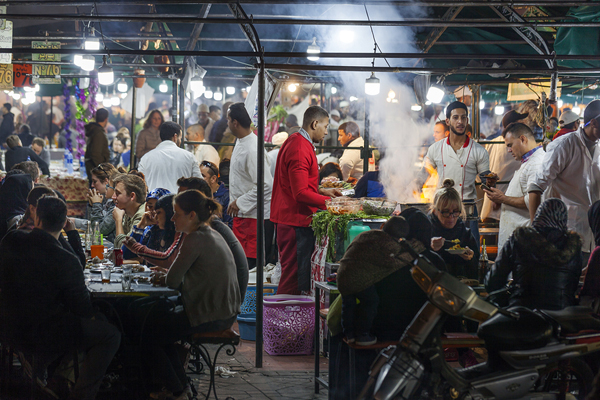Guide to Residency in Morocco
Summary: Looking for guidance on obtaining residency in Morocco? Discover the steps involved and read advice from expats, nomads, and others already in Morocco.

Obtaining a residency visa in Morocco is not always easy, but our Guide to Residency in Morocco gives newcomers an overview of the steps involved and advice from others who have already navigated the process.
- Research Moroccan Residency Requirements
- Visit the official Moroccan government website or contact the Moroccan consulate in your home country to understand the types of residency permits available and their specific requirements.
- Identify the type of residency you are eligible for, such as work, study, family reunification, or retirement.
- Gather Necessary Documentation
- Prepare your passport, which must be valid for the duration of your stay.
- Obtain recent passport-sized photos.
- Collect any additional documents that may be required, such as a criminal background check, proof of employment or enrollment in an educational institution, marriage certificate, or proof of financial means.
- Enter Morocco on an Appropriate Visa
- Apply for a visa that corresponds with your reason for requesting residency, if necessary. Some nationalities do not require a visa for short stays.
- Ensure that you enter Morocco legally with all the correct documentation to avoid issues when applying for residency.
- Apply for a Tax Number
- Visit the local tax office (Direction Générale des Impôts) to apply for a tax number (Identifiant Commun de l'Entreprise - ICE).
- Fill out the required forms and submit them along with any requested documentation, such as your passport and proof of address in Morocco.
- Wait for your tax number to be issued, which you will need for the residency application process.
- Open a Local Bank Account
- Choose a Moroccan bank and visit a local branch.
- Provide your passport, proof of address in Morocco, and your new tax number to open an account.
- Deposit funds into your account, as proof of financial means may be required for your residency application.
- Apply for Residency at the Local Police Station
- Locate the nearest police precinct (Commissariat de Police) that handles residency applications.
- Complete the residency application form, which can be obtained from the police station or downloaded from the official Moroccan government website if available.
- Submit the application form along with all the required documents, including your passport, tax number, bank statements, photos, and any other documents that support your residency claim.
- Pay the application fee, if applicable.
- Attend the Residency Interview
- After submitting your application, you may be required to attend an interview at the police station.
- Answer all questions truthfully and provide any additional information or documentation requested by the interviewing officer.
- Wait for Residency Card Issuance
- Following your application and interview, there will be a processing period during which your application is reviewed.
- Stay in contact with the police station to check on the status of your application.
- Once approved, you will be notified to collect your residency card (Carte de Séjour).
- Register with Your Country's Embassy or Consulate
- Once you have obtained your residency status, it is advisable to register with your home country's embassy or consulate in Morocco for additional support and to stay informed about matters affecting your nationality.
What tips do expats have about residency and visas in Morocco?
"In order to visit Morocco, foreign nationals must obtain a visa prior to their arrival. The process of applying for a visa involves submitting an application form, a valid passport, two passport-sized photographs, and a fee. Depending on the purpose of the visit, additional documents may be required. In order to obtain residency in Morocco, foreign nationals must submit an application form, a valid passport, two passport-sized photographs, a valid residence permit, and a fee. Depending on the purpose of the residency, additional documents may be required. The application process may also involve an interview with a representative from the Moroccan government," commented one member living in Morocco.
About the Author
 Betsy Burlingame is the Founder and President of Expat Exchange and is one of the Founders of Digital Nomad Exchange. She launched Expat Exchange in 1997 as her Master's thesis project at NYU. Prior to Expat Exchange, Betsy worked at AT&T in International
and Mass Market Marketing. She graduated from Ohio Wesleyan University
with a BA in International Business and German.
Betsy Burlingame is the Founder and President of Expat Exchange and is one of the Founders of Digital Nomad Exchange. She launched Expat Exchange in 1997 as her Master's thesis project at NYU. Prior to Expat Exchange, Betsy worked at AT&T in International
and Mass Market Marketing. She graduated from Ohio Wesleyan University
with a BA in International Business and German.
Some of Betsy's articles include 12 Best Places to Live in Portugal, 7 Best Places to Live in Panama and 12 Things to Know Before Moving to the Dominican Republic. Betsy loves to travel and spend time with her family. Connect with Betsy on LinkedIn.
Additional Information:
- Morocco Guide
- Healthcare & Health Insurance in Morocco
- Members Talk about Healthcare & Health Insurance in Morocco
- Best Places to Live in Morocco
- Real Estate in Morocco
- Guide to Real Estate in Morocco
- Pros & Cons of Living in Morocco
- Cost of Living in Morocco
- Getting a Driver's License in Morocco
- 15 Best Places to Live in Morocco
- How to Navigate the Health System in Morocco
- Guide to Residency in Morocco
- Pros and Cons of Living in Morocco 2025
- 2025 Guide to Moving to Morocco



